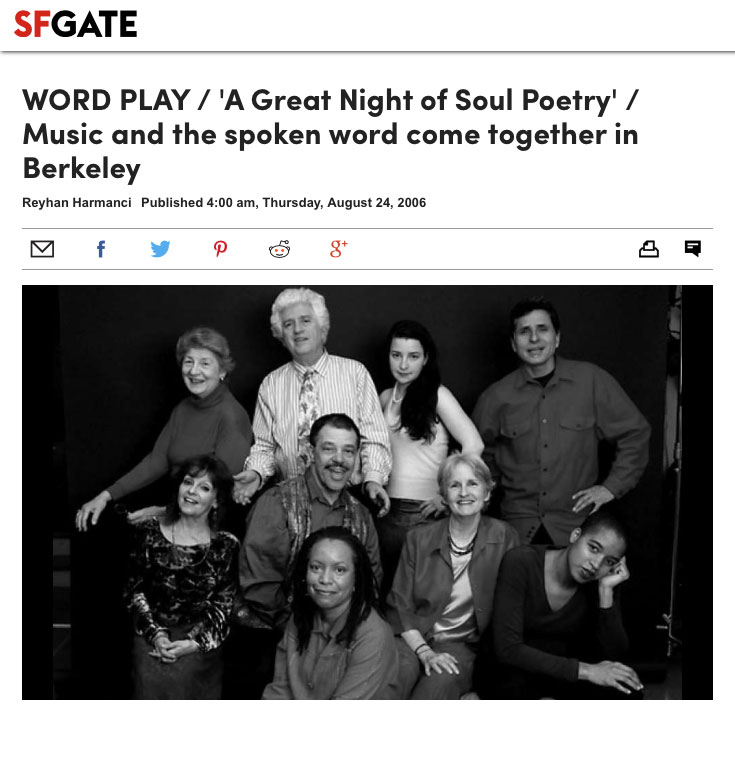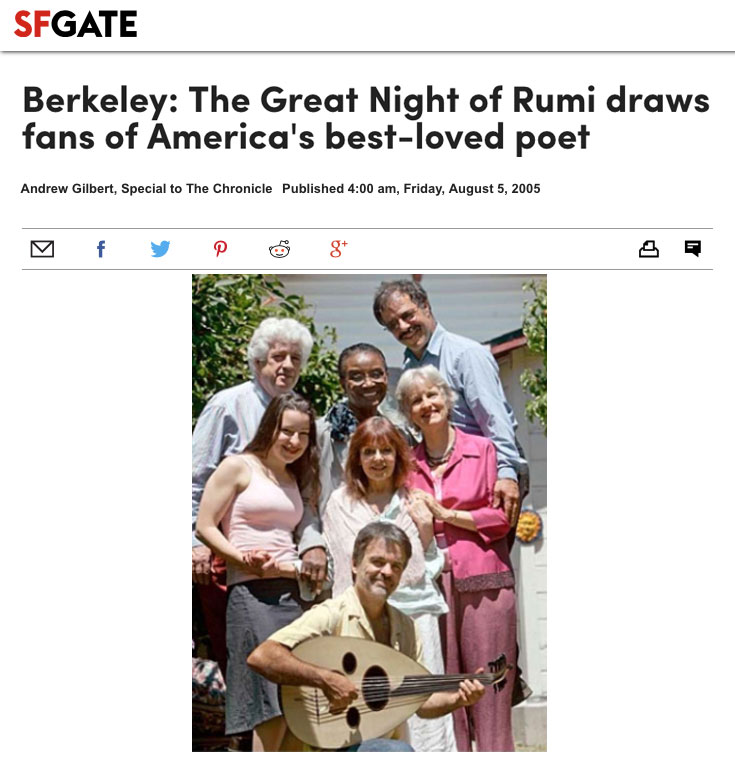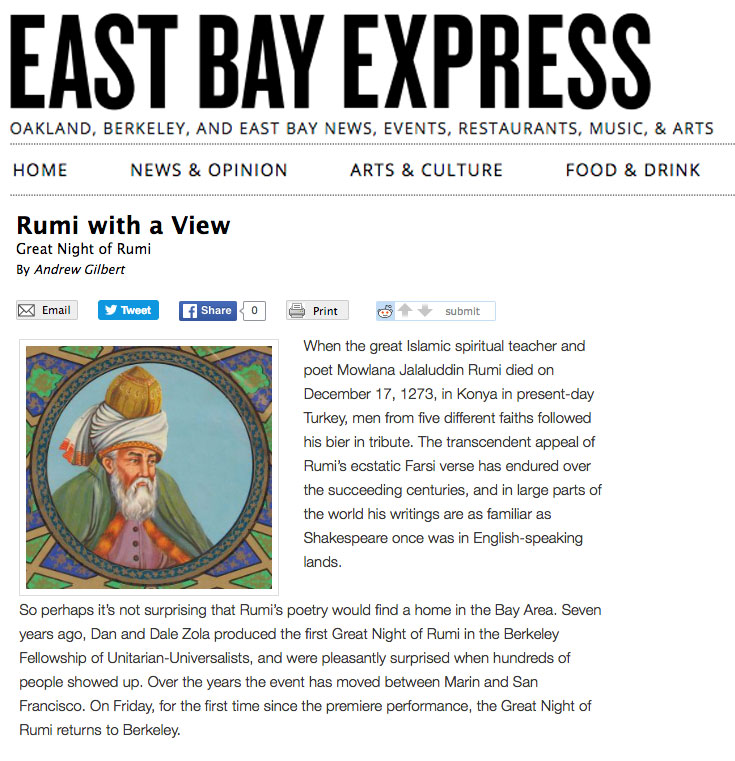 A Great Night of Soul Poetry’/Music and the spoken word come together in Berkeley
A Great Night of Soul Poetry’/Music and the spoken word come together in Berkeley
Reyhan Harmanci, SF Chronicle
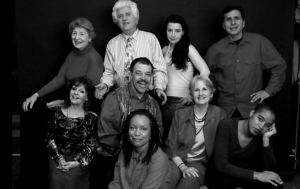 The term soul poetry doesn’t define any particular genre or style of poetry as much as evoke set of feelings. According to Dan Zola, who coined the term, his definition of soul is “that place w here the sacred meets the secular,” so he finds soul poems to be like soul music — poetry with an “intensity of feeling that was more than worldly, yet stayed grounded in worldly affairs.”
The term soul poetry doesn’t define any particular genre or style of poetry as much as evoke set of feelings. According to Dan Zola, who coined the term, his definition of soul is “that place w here the sacred meets the secular,” so he finds soul poems to be like soul music — poetry with an “intensity of feeling that was more than worldly, yet stayed grounded in worldly affairs.”
Soul poetry, then, doesn’t deserve to sit idle in a book. It begs to be performed. To that end, Dan and his wife, Dale Zola, have been presenting “A Great Night of Soul Poetry” at the Freight & Salvage in Berkeley. Now in its fifth year, “A Great Night” celebrates the possibilities of putting great poetry to music, and making it more than a reading — making it an event.
“We think of it kind of like ‘The Ed Sullivan Show,’ ” says Dale Zola.
“Like a variety show, there’s a bunch of different acts. Dan is emcee, there are various presenters.” What it isn’t, Dale says, is a typical open mike. “It’s not like a poetry reading in high school. We do a lot of work pairing musicians with the poetry.”
An audience can expect to be entertained in the same way as any theatrical performance. The Zolas comb through all kinds of poetry, and enlist their musician friends to provide backup support or to put the words to song. For the fifth anniversary show, the poet Robert Housden (author of the best-selling “Ten Poems to Change Your Life”) will perform. There will be a Beat happening with Lawrence Ferlinghetti’s “Dog” backed by a rhythm section, a poem written by Leonardo da Vinci, and, perhaps for the first time ever, Chronicle columnist Jon Carroll will have a column edited to conform to the standards of soul poetry and read aloud.
But it’s not just the funny works that get read. “When I Die” by Mary Oliver and “My Father Went to Funerals” by Howard Nelson will also be presented. “I’m so intent on people knowing that this is not one of those deadly serious poetry evenings that maybe I emphasize the humor a little too much,” says Dale Zola. “There is plenty of humor, but some real dipping into melancholia and other depths, too.”
The night got started after the Zolas read the work of best-selling Sufi mystic Rumi and felt inspired to organize readings of his work. With the success of those nights, they decided to put the revue form to use for poetry from all kinds of sources. “There’s always a real feeling of aliveness and warmth,” says Dale Zola. “I think an audience can expect to experience beauty, feel things, laugh, maybe shed a tear or two. We’re trying to give people stuff to think about.”
She says that they try to choose accessible poems. “We don’t pick poems that we don’t know what the hell they’re talking about.” The Zolas are aware of the potential for people to read the words “soul poetry” and tune out, which is why they have another catchphrase for the night. “Dan sometimes says we should have a bumper sticker,” she says with a laugh. “It would be ‘poetry — honest, it’s not as bad you think.’ ”
San Francisco Chronicle
August 24, 2006
 THE GREAT NIGHT OF RUMI
THE GREAT NIGHT OF RUMI
Draws Fans of America’s Best-Loved Poet
by Andrew Gilbert, Special to The Chronicle
Quick, name the most popular poet in the United States.
Judging by book sales, it’s not Robert Frost, Sylvia Plath or even Walt Whitman, though one can certainly see Whitman as the spiritual descendent of Jelaluddin Rumi, whose works have sold some half a million volumes in recent years. At a time when there’s a lot of reckless talk about a clash of civilizations pitting the West against the Muslim world, the fact that an Islamic mystic born in a land that is now part of Afghanistan has a vast American following certainly bears contemplation.
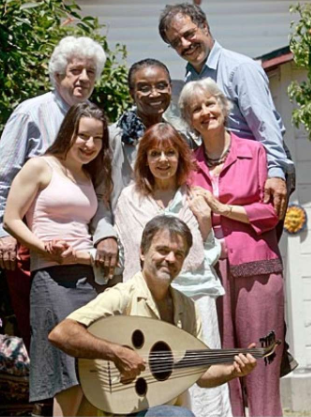 The appeal of Rumi, a 13th century spiritual teacher whose Farsi verse is revered and recited throughout Iran and Central Asia, isn’t merely a publishing phenomenon. Since 1993, Berkeley’s Dan and Dale Zola have produced the Great Night of Rumi at least once a year, drawing packed houses for an event dedicated to the presentation of the poet’s works accompanied by music. This year’s Great Night takes place on Saturday at Freight & Salvage, featuring a diverse group of participants including storytellers, performance artists, actors and whirling dervishes from the Mevlevi Order of America.
The appeal of Rumi, a 13th century spiritual teacher whose Farsi verse is revered and recited throughout Iran and Central Asia, isn’t merely a publishing phenomenon. Since 1993, Berkeley’s Dan and Dale Zola have produced the Great Night of Rumi at least once a year, drawing packed houses for an event dedicated to the presentation of the poet’s works accompanied by music. This year’s Great Night takes place on Saturday at Freight & Salvage, featuring a diverse group of participants including storytellers, performance artists, actors and whirling dervishes from the Mevlevi Order of America.
“There are poetry slams, and there are recitals by famous poets, but this is a little different, people reciting someone else’s work, from memory, to music,” said Dan Zola. “There’s a flow between the music and the poetry, and the audience just becomes enraptured by the poems, caught up in the imagery, and a little community is formed.”
The event unfolds like a revue, with one performer following the next, accompanied by violinist Irene Sazer, Geri Hegedus on oud, saz, violin and mandocello and tabla master Arshad Sayed. Most poems are taken from the books of Rumi interpreter Coleman Barks, who has supported the Great Night by giving permission to use his English language versions, though Dr. Nader Ostvar, an Iranian-born physician, will recite Rumi in the original Farsi.
With more than a decade of experience staging the event — the couple also produces the Great Night of Soul Poetry, which features the work of many writers — the Zolas have assembled a collection of performers who each bring a personal style to their poem.
“Over the years the quality has really improved,” says Dale Zola, a songwriter, music teacher and vocalist who performs jazz standards at retirement homes. “The first one was almost on the level of a talent show. We didn’t even know what people were going to do when they got up on stage. We just hoped they wouldn’t read the same poems. Now there’s a tremendous amount of attention to who does what poem, in what order and with what music, and each piece is like a jewel.”
“We always include a lot of humor,” adds Dan Zola, who works as a gardener for East Bay Municipal Utility District, “because we don’t appreciate going to spiritual events that are so serious you just want to shriek. This has a lot of laughter, and some poems that are tender, some funny stories, some lyric poems.”
For Hari Meyers, a retired psychotherapist from Sebastopol who has developed a practice as a storyteller with a focus on Greek and Vedic myths, the Great Night has turned into a consistently captivating forum.
He attended the first event in 1993 at the Berkeley Fellowship of Unitarian-Universalists as an audience member, and was invited the next year to recite a poem. He’s participated ever since.
“Often I get a fairly humorous teaching story, which is fitting because I’m a great ham,” Meyers says. “What I like about Rumi is that his work is truly transporting. It’s turned into a very reliable event, successfully sacred each time. There’s something about the down to earthiness of the metaphors. He finds his way to the divine through the earthworms.”
Born into a long line of Persian religious scholars in Mazar-e-Sharif, Rumi fled with his family from the Mongol invasion and traveled throughout the Muslim world, eventually settling in Konya in present day Turkey. When his father died, Rumi succeeded him as a professor of religious sciences, but it was his encounter with a wandering dervish, Shams of Tabriz, that ignited his mystical spiritual quest. His poetry is marked by a sense of intimacy with the divine, often described in his verse as the Friend, and is remarkably accessible to people of any, or no, faith.
The person almost single-handedly responsible for Rumi’s popularity in the United States is Coleman Barks, a poet in his own right who has published 15 volumes of Rumi translations, including his most recent book, “The Soul of Rumi” (HarperSanFrancisco). Though he doesn’t read Farsi, he works with various English translations and renders Rumi’s verse in a conversational American idiom that preserves the poet’s sly humor, earthy wisdom and sharp, but affectionate observations of the human condition.
Barks, who retired after 30 years of teaching at the University of Georgia in Athens, undertook the project of interpreting Rumi’s verse in 1976 at the suggestion of fellow poet Robert Bly. What started as a personal spiritual search became a publishing phenomenon in 1995, when Bill Moyers featured him in the 1995 PBS special “The Language Of Life.”
In an interview several years ago, Barks sought to explain Rumi’s enduring appeal. “It may be that we want some grand, inclusive voice here now, one that is very deeply meditative, honoring the beauty of the world and the senses, as well as consciousness,” Barks said. “He adores whatever humans do, no matter how stupid or absurd. He delights in the drama going on around us. He says a human being is a guest house, and we have all these visitors, the emotions, the moods, the compulsions, the jealousy and the anger, and we’re just supposed to be a good host. We’re supposed to welcome them all and entertain them, because everything is somehow a message from the mystery.”
For the Zolas, the Great Night of Rumi is a venue for introducing Rumi to those unfamiliar with the poet, and of deepening the experience of hearing his work for those who have already encountered it. They stress that he is the most ecumenical of mystics.
Dale Zola relates the oft told story of Rumi’s funeral in Konya after his death on Dec. 17, 1273, when men from five different faiths followed his bier in tribute.
Dan Zola offers his favorite lines of Rumi, which are carved into the portal of an Armenian church: Come come whoever you are, worshiper, wanderer, lover of leaving. Ours is not a caravan of despair. Though you have broken your vows 1,000 times, come, come again, come.
“I love that,” Dan says. “In a world that’s going crazy, it’s certainly a model for how we can find what’s common beneath the differences.”
San Francisco Chronicle
Summer 2005

When the great Islamic spiritual teacher and poet Mowlana Jalaluddin Rumi died on December 17, 1273, in Konya in present-day Turkey, men from five different faiths followed his bier in tribute. The transcendent appeal of Rumi’s ecstatic Farsi verse has endured over the succeeding centuries, and in large parts of the world his writings are as familiar as Shakespeare once was in English-speaking lands.
So perhaps it’s not surprising that Rumi’s poetry would find a home in the Bay Area. Seven years ago, Dan and Dale Zola produced the first Great Night of Rumi in the Berkeley Fellowship of Unitarian-Universalists, and were pleasantly surprised when hundreds of people showed up. Over the years the event has moved between Marin and San Francisco. On Friday, for the first time since the premiere performance, the Great Night of Rumi returns to Berkeley.
For Dan Zola, the event’s increasing popularity is sweet validation of a Rumi-esque moment of inspiration. “I’d never had this happen, but I was walking down the street one day and an idea literally hit me,” Zola said. “It was a physical sensation, like in the cartoons when the idea bubble comes from one end of the frame and hits the person: Wouldn’t it be great to have a whole night of Rumi’s poetry, spoken aloud from memory?”
The event’s format is like an old-fashioned revue, with one performer after another taking about ten minutes each to recite or sing a Rumi work. The Marin-based dervishes from the Mevlevi Order of America will perform the ecstatic whirling dance inspired by Rumi’s writing. Among the dozen or so presenters are Doug Von Koss, who originally inspired Dan Zola to start memorizing Rumi’s poetry, actress Chetana Karel, vocalist Kirsten Falke, and Afghani-born poet Halim Shayek (reciting Rumi’s verse in the original Farsi), all accompanied by various musicians, including flutist Ernie Mansfield, Claude Palmer on oud, and Brad Van Cleave on tabla.
“One of Rumi’s lines is ‘Don’t come to us without bringing music,’ so at the first event we accompanied the poems with cellos, sitars, flutes, and drums, and it’s taken on a life of its own,” Zola said. “There’s also a wonderful tradition of jazz and poetry that we’re reclaiming, which somehow turned into the parody of the beatnik with the goatee playing bongos.”
Born in Afghanistan into a long line of Persian religious scholars, Rumi fled with his family from the Mongol invasion and traveled throughout the Muslim world, eventually settling in Konya. When his father died, Rumi succeeded him as a professor in religious sciences, but it was his encounter with a wandering dervish, Shamsuddin of Tabriz, that launched his mystical spiritual quest. His poetry is marked by a sense of intimacy with the divine, often described in his verse as the Friend, and is remarkably accessible to people of any, or no, faith.
“For a lot of people Rumi is a spiritual teacher and they’re coming at him from that angle,” Dale Zola said. “We approach him the way you’d approach an artist, a John Coltrane, and whatever his art evokes in you is what’s important.”
East Bay Express
August 22, 2001

